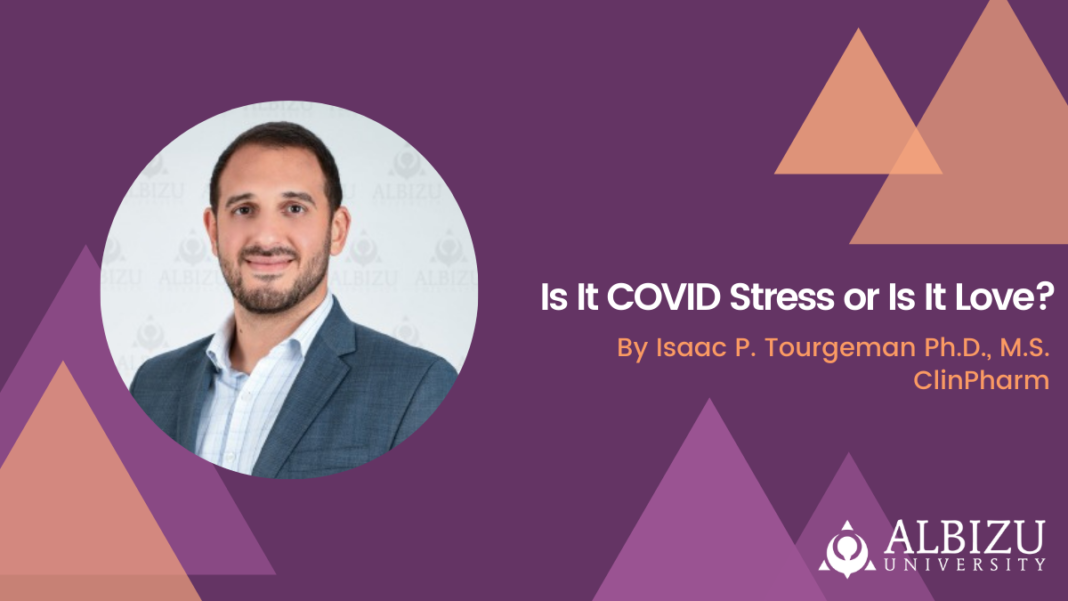From Hallmark cards to ballads of passion, the heart has intimately been connected to love, affection, and romance for much of our human existence. How cardiac function and emotion first became associated is a fair question and the answer lies in our response to stress.
So what happens to those feelings when we find ourselves in a constant state of stress and social proximity is a health hazard?
If the complex physiology of being in love is closely related to being stressed out, could simplifying that understanding be the key to maintaining our personal and social stability?
Understanding the Anatomy of Our Emotions
We often mistakenly think of our brains as purely rational organs of cortical and higher functions. In fact, significant areas in our brains are not governed by linear processes often ascribed to cortical function, but rather, they operate in a more ambiguous manner driven by exchanges of hormones and neurotransmitters that can evoke emotions like fear, anger, happiness, and love.
These chemical reactions, which are also responsible for governing our life-sustaining functions, are essentially the root of our emotions, which lie deep within our brains and often operate in a more primitive manner than we would like to think.
Most of us have experienced the sensation of being “love-struck.” The heart pumps harder, the world seems to grow more vivid, and we feel overtaken by a general sense of floating as we focus on the object of our affection.
While this experience has been romanticized to be associated with love, it’s actually just our sympathetic nervous system being engaged – the set of functions that directs the body’s rapid involuntary response to dangerous or stressful situations.
Yes, the same physiological system responsible for our stress-related “fight or flight” response is also what underlies feelings of love. But why does it feel so different?
The answer to this question is not nestled in our chest but rather rests between our ears. Our brain is what labels a stimulus or experience as danger, benign, or love.
The Crossroads of Stress and Love
While this revelation is unlikely to launch a new trend toward brain-shaped chocolate boxes or Valentine’s Day cards adorned with “I Brain You,” understanding the brain’s involvement can help explain why it often feels like love makes little sense. This information is not necessarily new, since Hippocrates and other ancient philosophers who laid the way for modern medicine and science had already theorized that “humors” (hormones) were responsible for many of our behaviors and thoughts.
Does the isolation make us long more for love, or do our apprehensions serve to generalize and dilute the love? Since we now know love is intimately connected to stress, does a heightened and prolonged stress response inhibit or perpetuate love?
It depends.
Indeed, it would be silly to think that the answer to a question that involves something as complex as love would be simple, yet simplifying and understanding the situation may be vital in helping us maintain our stability.article continues after advertisement
Is The Pandemic Killing Love?
Since most of our hearts have been pumping a little faster due to the generalized stress caused by COVID-19 and the ensuing quarantine, can this result in an avoidance of love? Much of the data researching Post-Traumatic Stress Disorder has shown that human response to a specific traumatic event can often be generalized to other stimuli and situations in their lives, resulting in heightened vigilance, reactivity, and ultimately isolation.
Furthermore, suspiciousness about the accuracy of COVID information and resulting worry over a potential infection may make us wary of others’ intentions, and even lead to misjudging social cues.

Amidst the disarray, technology has taken a more central role in resolving these hindrances with dating apps and social media having become our primary forms of interaction and communication. Exclusive restaurant reservations have been replaced with Zoom calls and single-serve platters. Chocolate kisses and flowers have been displaced by emojis and memes. Worst of all, physical touch and affection have become quite taboo along with most of our displays of emotions being muffled by protective coverings.
While human beings are truly creatures of habit, our survival has been a product of our ability to adapt. Now, we have little choice but to do just that.
Each generation has its unique nodal points that both define it and direct it. This generation has definitely had its share. With the world currently in the grip of a pandemic, what matters most is what we do next.
So despite the bleak, virus-laden facts, do we cling to our previous conventions of love, or do we evolve beyond the need for dated references?
I believe the best course of action lies in the middle where we can adapt some of our preconceptions in light of new occurrences.
So there’s no need to throw out the heart-shaped boxes or edit famous love scenes, but know that although you may feel it in your chest, your brain is still making the decisions.
See the full article here: https://www.psychologytoday.com/intl/blog/everyday-life-simplified/202102/is-it-covid-stress-or-is-it-love






